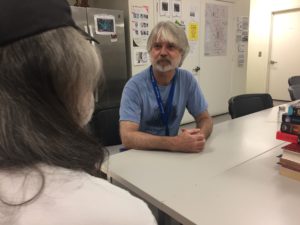TRANSPARENCIES
A monthly newsletter from Integral Care.
A monthly newsletter from Integral Care.

A Message From Our CEO
This June we recognize PTSD (Posttraumatic Stress Disorder) Awareness Month and the opportunity to ensure those living with PTSD get the help they need. PTSD is a mental health problem that some people develop after experiencing or witnessing a life-threatening event, like combat, a natural disaster, a car accident, or sexual assault. The trauma from this event can result in flashbacks, bad dreams or frightening thoughts. Seven out of every 100 people in the U.S. will have PTSD at some point in their lives. For individuals experiencing PTSD, certain situations, objects or even words can trigger the re-experiencing of trauma. PTSD is commonly accompanied by depression, substance use disorder, or one or more other anxiety disorders.
Veterans, a vital and significant segment of our community, commonly experience PTSD, as they may have been on missions in the military that exposed them to traumatic and life-threatening experiences. Between 11-20% of those who served in Operations Iraqi Freedom (OIF) and Enduring Freedom (OEF) have PTSD in any given year. Currently, we know that there are 20 Veteran suicide deaths per day, representing 18% of all deaths by suicide in the United States, a phenomenon that is highly concerning for our communities.
Last year, Integral Care served 900 Veterans including 170 Veterans experiencing homelessness. The Military Veteran Peer Network, a collaboration with Health and Human Services and Samaritan Center, provides peer-to-peer counseling services, outreach and a Jail Diversion Trauma Recovery system of services for Veterans. Our Safe Haven program provides temporary housing for up to 15 Veterans experiencing homelessness and mental illness and/or substance use disorders.
New Veteran-centered programs at Integral Care include the Veterans and Family Program in collaboration with Seton Health Care Family, offering solution-focused outpatient counseling, case management, outreach and linkage to community services to Veterans and their families. Also, our Housing First Oak Springs apartment community that is slated to open 2019, will offer a safe place to live and appropriate support services to people experiencing homelessness, 50% of which will be Veterans.
Federal legislation has been introduced under the VA Mission Act that would include $5.2B in funding for Veterans ensuring access via one cohesive program. Locally, the Texas Senate Committee on Veterans Affairs and Border Security met last week and Veterans Affairs priorities included expanding telemedicine and streamlining access to rural communities in need of mental health care. These initiatives and overall focus on increasing access locally and federally are important to providing Veterans and family members with the opportunity to make their lives better.
I encourage you this month to help raise public awareness of PTSD and to support all those experiencing it, particularly our Veterans, in order to build a community of strength.

David Evans
Chief Executive Officer
Safe Haven
 Safe Haven serves as a path to permanent housing and improved well-being for Veterans experiencing chronic homelessness and mental illness and/or substance use disorders. The program provides temporary housing and support as they transition from living on the street. According to a 2015 VA report, Integral Care’s Safe Haven performs the best of the 23 Safe Haven programs serving Veterans across the U.S. – Seventy-eight percent are graduating to permanent supportive housing.
Safe Haven serves as a path to permanent housing and improved well-being for Veterans experiencing chronic homelessness and mental illness and/or substance use disorders. The program provides temporary housing and support as they transition from living on the street. According to a 2015 VA report, Integral Care’s Safe Haven performs the best of the 23 Safe Haven programs serving Veterans across the U.S. – Seventy-eight percent are graduating to permanent supportive housing.
The success of Safe Haven lies in its flexible, nonjudgmental, low-demand approach to clients – using practices consistent with Housing First, harm reduction, and motivational interviewing models. For example, Safe Haven does not require Veterans to be sober and allows them to sleep outside if they are more comfortable doing so. According to Program Manager David Gomez,
“Our primary responsibility is to reinstate clients’ humanness. That has been lost out on the street. We show them dignity and respect. That kindles hope that things can change.”
Enrique, who served as an Army Ranger in Vietnam, is excited about the changes he’s making with the help of Safe Haven.
“You survive a war like Vietnam….A lot of us have health issues. I have a diagnosis of PTSD. It’s easy to lose your way. And it’s hard to find a place to live on fixed income. These people at Safe Haven, they are doing an incredible job. By next month I should have a place.”
Safe Haven began in 1996 as temporary housing for anyone experiencing homelessness and mental illness and/or substance use disorders. Since 2014, it has helped Veterans specifically, thanks to a collaboration with Homeless Programs at the Central Texas Veteran’s Affairs Health Care System. Safe Haven’s most important asset is its dedicated staff of 10 full-timers and 4 relief assistants. Many of them have been with the program more than 15 years. Three are Veterans themselves.
Central Texas Veterans Health Care System
The Central Texas Veterans Health Care System (CTVHCS) is the local branch of the U.S. Department of Veteran’s Affairs (VA). CTVHCS upholds the VA mission – to serve and honor the men and women who are America’s Veterans. The Central Texas system is one of the largest integrated health systems in the country, with medical centers in Waco and Temple, a multi-specialty outpatient clinic in Austin, as well as clinics in 5 outlying cities and towns.
 The Homeless Programs at the CTVHCS provide a wide array of services to Veterans who experience homelessness – case management, help finding housing and employment, legal assistance, primary and mental health care, and mental health residential rehabilitation and treatment programs. The collaboration with Integral Care’s Safe Haven began less than 4 years ago as an effort to reach hard-to-engage Veterans experiencing chronic homelessness -individuals who have not engaged in other VA Homeless Programs or never successfully completed a program.
The Homeless Programs at the CTVHCS provide a wide array of services to Veterans who experience homelessness – case management, help finding housing and employment, legal assistance, primary and mental health care, and mental health residential rehabilitation and treatment programs. The collaboration with Integral Care’s Safe Haven began less than 4 years ago as an effort to reach hard-to-engage Veterans experiencing chronic homelessness -individuals who have not engaged in other VA Homeless Programs or never successfully completed a program.
The collaboration has streamlined many of the processes a Veteran needs to complete in order to gain permanent housing. It is improving Veterans’ quality of life, reducing arrests and recidivism, substance use and emergency room visits. By reducing barriers to housing and improving Veterans’ overall health and well-being, this partnership helps everyone in Travis County reach their full potential.
April: Time of Terror Calls for Increased Emotional Support
March: Stopping the cycle of incarceration for individuals with mental illness
February : Equity in mental healthcare for everyone
January : Improving Mental Health Through Partnership & Collaboration
December : Strength Through Community
November : Healthy Lifestyles Improve Well-Being
October : National Child Health Day
September : Strengthening Families and Communities